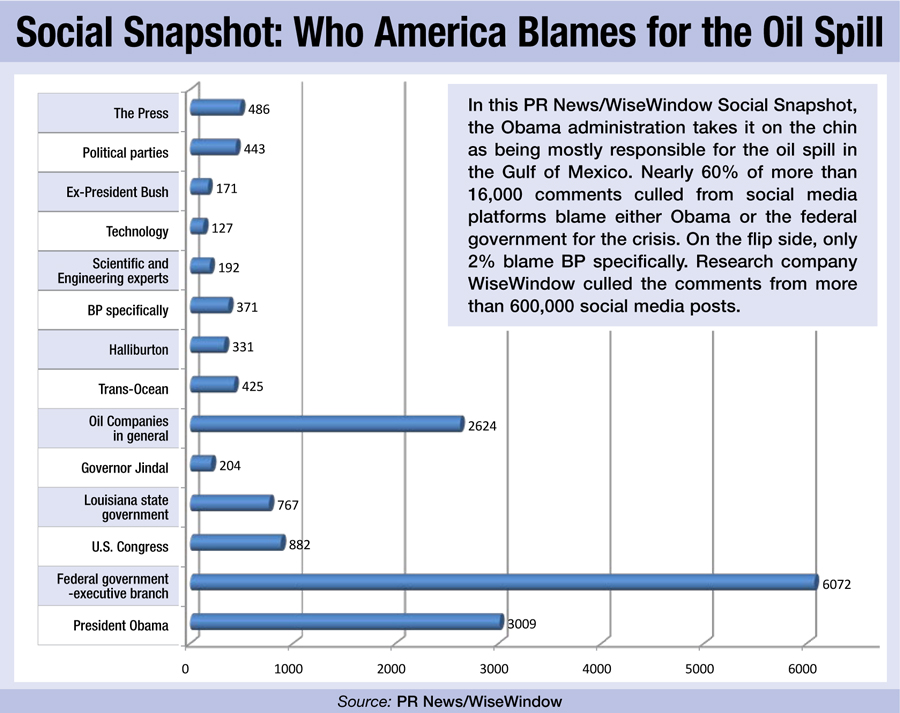As BP tries yet again at press time to put a cap on the gushing oil leak a mile under the Gulf of Mexico, the public’s ire continues to gush as well.
According to a recent poll by the Pew Research Center, seven out of 10 of respondents say the company has done a poor or only fair job in handling the April 20 well blowout and spill in the Gulf of Mexico . The Obama administration got slightly better marks, with 57% rating the government’s response poor or only fair.
A similar poll last week, fielded by USA Today/Gallup, finds Obama in hot oil with the public, as 53% rate Obama’s handling of the crisis “poor” or “very poor”; 60% said the federal government’s response was “poor”; but most of the vitriol was aimed at BP—73% said the company’s response was “poor.”
As the negativity spreads much like the oil itself, it’s clear that communicators involved in the disaster have been challenged like never before—and already there are PR lessons to be learned. [Editor's note: The BP spill seen through the lens of PR will be discussed at PR News' Media Relations Forum in Washington, D.C., on June 17.]
VIEW FROM THE SOCIAL SET
New data, exclusive to PR News from research company WiseWindow, gives a different perspective on the criticisms. Trolling more than 16,000 social media comments that touched on blame for the spill (out of some 600,000 total posts on the disaster), WiseWindow found that 57% assigned responsibility for the spill to Obama and the federal government, while just 2% blamed BP specifically.
Granted, there’s a difference between who “gets the blame” for the spill vs. who has the better response after the accident. But these numbers aren’t a big surprise to Gene Grabowski, senior VP at crisis PR agency Levick Communications, based in Washington, D.C.
“Because Obama jumped into the crisis in a very visible way, he became a big part of the public’s target,” says Grabowski. “At least up until now, BP has been a faceless entity to the American public, while a president, symbolically, is easy to blame.”
That view is shared by Eric Dezenhall, CEO of Washington, D.C.-based Dezenhall Resources. “There is no more powerful urge than the urge to blame,” says Dezenhall. “Americans do not believe in acts of God, we believe in masterminds. Obama was praised for being the next Lincoln before he was even sworn in, largely because of atmospheric factors, so he is going to get blamed for things that had nothing to do with him.” A PR lesson: Encouraging unrealistic leadership expectations could come back to haunt you.
Eliot Hoff, senior VP at APCO Worldwide, says that the Obama administration brought this blame on themselves. “They took a very public position that they were leading the efforts around this crisis,” says Hoff. “The public—the real victims here—expect the government to protect them.”
SLOWING NEGATIVE FLOW
So how does Obama and his administration quell the negative public opinion? Grabowksi sees a basic mistake that governments—and organizations— often make: all talk, no action. “We heard about their experts who were working on the problem, but we never saw them,” he says. “Put your experts out there and let people know that something is being done.”
As for the president, Grabowski feels that he’s shown little compassion, and playing the litigation card by sending Attorney General Eric Holder to Louisiana is bad timing. “Prosecuting may become important later, but now is not the time,” says Grabowski. “They need to show the public some hope.”
PASSING PR BY?
Dezenhall says in this magnitude of crisis, PR is of “collateral importance, because everything you do will be declared to have been botched. Obama could have impaled himself on an oil drill and the pundits would have shouted ‘too little, too late.’”
Hoff also says that PR has taken a backseat in this crisis—as well it should. “There is a lot of discussion that the administration should be more sympathetic, as if PR will make this better,” says Hoff. “What the government needs to do is put every effort into stopping this leak as soon as possible—and the same for BP.”
BP’s BLUNDERS
And what of BP? Grabowski said the company has done several things wrong from the outset, including:
• “BP never seemed to be in control from the start.”
• “It never showed a ‘war room’ with employees hard at work.”
• “BP allowed the story and images of the story to be defined by others.”
• “The CEO never spoke enough about clean-up efforts and helping the people along the Gulf Coast.”
Grabowski goes on to say the BP CEO Tony Hayward needs to “speak less like a litigant and more like a leader.” Costs and blame are irrelevant now, he adds, and Hayward must show that even though he might not have all the answers, he’s doing everything possible to make things right.
A new apologetic ad campaign may set BP and Hayward on that course.
Dezenhall takes a darker tack on BP’s predicament: “BP doesn’t have a PR problem,” he contends. “It is the height of narcissism for the media to be positioning themselves as the most important audience here, the logic being, ‘If BP only paid us the most attention everything would be fine.’ Plus, it is the height of arrogance for PR people to be implying that they have the answer to this.”
Dezenhall says BP’s greatest PR sin came years before the spill. “They cynically tried to position themselves as an alternative energy company,” he says. “This evangelical belief in the power of spin is what makes people distrust big corporations.” PRN
CONTACT:
Gene Grabowski, [email protected]; Eric Dezenhall, [email protected]; Eliot Hoff, [email protected].
